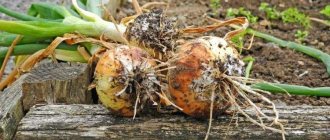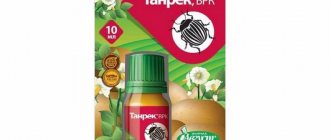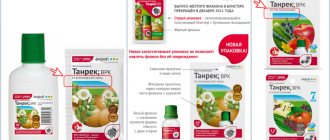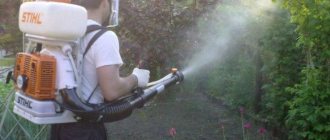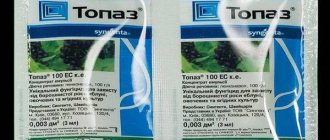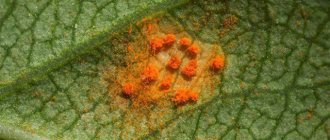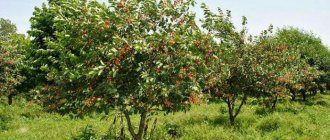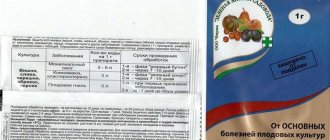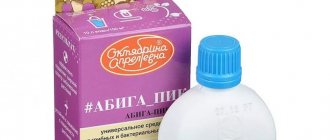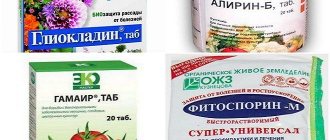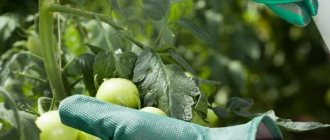Basic requirements for fungicide Falcon
This fungicidal drug was developed by specialists from Bayer (Germany)
. Falcon was created specifically to protect grains and beets against fungal diseases - powdery mildew and a number of others. Powdery mildew spreads too quickly throughout the area, so even if you start treating crops against powdery mildew when the first symptoms appear, the plants are unlikely to be saved.
Therefore, the drugs being created must instantly kill the pathogen, but not accumulate in the grains during their milk maturity. And the fungicide should not be allowed to get into the soil at all, since it decomposes too slowly. Therefore, next season it is no longer possible to plant cultivated plants in this place.
It was also important to create a drug that would meet the European standard, and the grain would withstand competition in the market.
Therefore, the following requirements were set for the fungicide:
- The fungicide should not contain active substances that would accumulate in crops and their fruits, as well as in fertile soil. But the presence of chlorine in the preparation is allowed, which quickly decomposes in the soil and plants.
- It is also important that such a product does not impart an off-flavor to fruits and grains.
- The product should destroy fungi quickly and 100%.
- It is not always possible to prevent strangers from appearing in fields treated with fungicide. Therefore, such a product must have low toxicity - no higher than hazard class 2, so that it is harmless to humans upon direct contact.
- For beneficial insects, birds and warm-blooded animals, the toxicity class of the product should not be higher than 3. Also, the drug should not cause damage to bees from the apiary if it is located next to the treated field.
- Also, fungi that cause diseases should not develop resistance to the fungicide, even if treatments were carried out up to 3-4 times per summer and when grown in one place for at least 4 years.
- After the packaging of the product is opened, the fungicide itself should retain its properties for two seasons. Therefore, even if a large package of the drug is not used up during the season, it could be used next summer.
- The instructions for using the product are easy and understandable, and the price of the drug is quite low.
Interesting to know!
The cost of the product was reduced by producing the fungicide in the form of a concentrate, highly soluble in water, and an emulsion.
And specialists from a German company managed to combine all the positive qualities described above in the Falcon fungicide
.
The only drawback of the Falcon fungicide is its sensitivity to ambient temperature
– it actively affects fungi at temperatures no higher than 25 degrees Celsius, and in the heat it becomes ineffective.
And even if it is stored sealed, when exposed to strong heat, it also loses its positive qualities.
Important!
The Falcon product also helps gardeners cope with oidium on grapevines.
The drug is available in ampoules of 2 and 5 ml, bottles of 10 ml and 1 l, and also in canisters of 5 l.
Purpose
The fungicide is used to treat:
- grain crops from powdery mildew, spotting, rust, brittle stems, septoria;
- sugar beets of different varieties against powdery mildew, phomosis, cercospora;
- grapes, for the disease and prevention of oidium.
Description of the Falcon fungicide and its composition
The color of the liquid form of Falcon is red-brown with a brown tint.
Falcon consists of the following active and auxiliary substances:
- Spiroxamine (25%);
- Tebuconazole (16.7%);
- Triadimenol (4.3%).
Due to the fact that the Falcon fungicide contains several active substances, fungi do not develop resistance to this drug. Therefore, Falcon can be used several times per season with high efficiency
.
Main advantages of the drug
It is necessary to note the undoubted advantages of the Falcon fungicide:
- the product has preventive and therapeutic effects on plants;
- it is resistant to precipitation and is not washed off during the rainy season, so spraying with Falcon solution can be carried out at any time;
- Pathogenic microorganisms do not develop an addiction to the drug, so it is possible to use it several times during the summer;
- treated plants are protected against pathogens for a month, regardless of the degree of development of the disease and weather conditions;
- after spraying, the drug begins to act within a few hours;
- if the instructions for use are followed, this drug is slightly toxic to humans, beneficial insects and warm-blooded animals;
- Falcon product is quite cheap compared to other fungicidal drugs;
- cost-effectiveness in preparing working solutions;
- even after opening the sealed package, subject to storage rules, Falcon does not lose its effectiveness for 2 years;
- is not phytotoxic;
- Falcon product is compatible with fertilizers, most acaricidal and pesticide preparations;
- The product is easy to dilute and spray.
Of the negative qualities of Falcon, experts note:
- It is not recommended to use the fungicide for early ripening varieties of cultivated plants;
- the product is effective only at a certain air temperature (from 19 to 25 degrees Celsius).
Timing and frequency of vineyard treatment
To prevent infection of grapes with oidium (regardless of whether the plant was infected in the previous year), plants are treated before flowering and after flowering, during the period when berries begin to set on the clusters.
If the grapes are infected with spores of pathogenic fungi, the treatment is carried out 30 days before the harvest ripens. In case of plant disease, spraying is carried out 4 times during the year: before flowering, after flowering, 30 days before the crop ripens and in the fall, before the plant goes dormant.
How to use Falcon for different cultivated plants
The drug Falcon was created as a means to combat a specific disease - powdery mildew.
And Falcon helps fight it with those crops that are susceptible to this fungal disease. It is best to use the Fungicide for treating grain crops, sugar beets and vineyard bushes. You can also use Falcon to spray tomatoes, cucumbers, rose bushes, currants and strawberries.
The instructions for use tell you how to use the product for tomatoes, beets and grapevines, how to prepare the working solution and how many times to process these crops.
Norms for using Falcon fungicide for plants
One of the main advantages of the drug is its low toxicity, so this fungicide can be sprayed on plants against powdery mildew even when their fruits begin to ripen. But we must remember that the last treatment of cultivated plants should be done a month before harvest.
Important!
This fungicide should not be used for berry crops that are characterized by early ripening. The fact is that after treatment with Falcon, the fruits can be collected only after a month, and during this period the berries will be overripe and will be unsuitable for food.
Application of Falcon for cereal crops
Falcon is used for spraying barley, rye, wheat and oats planted in winter or spring.
For what diseases are spring and winter wheat and rye treated with Falcon:
- powdery mildew,
- septoria,
- fusarium head blight,
- rhynchosporiasis,
- helminthosporiosis,
- brown rust,
- stem rust,
- dwarf rust,
- yellow rust,
- powdery mildew,
- fusarium head blight,
- fragility of stems,
- striped spotting,
- net spotting,
- dark brown leaf spot.
The photo shows rhynchosporium blight of rye and barley
Treatment should be carried out during the heading period and during flowering.
You can carry out up to 2 treatments per season. For 1 hectare of area, 200-300 liters of working fluid are usually used; the consumption rate of Falcon for processing wheat and rye is 0.6 kg per 1 hectare.
For sugar beets
This root crop is treated against fungal diseases with Falcon up to two times per season:
- powdery mildew,
- cercospora,
- phomosa.
In the photo, beet cercospora
Up to 300 liters of working fluid should be consumed per hectare of area (approximately 30 ml for each square)
. Prepare the working solution according to the standard procedure. Consumption rate of Falcon for processing sugar beets: 0.5-0.6 kg per hectare of plantings. Spraying is carried out during the growing season, when the rows begin to close, the next one after 2 weeks. Working fluid consumption 300 l/ha.
Application of Falcon for grapes
Grapevines should be treated with this preparation according to a certain scheme, which takes into account not only the age of the grapes, but also the purpose of the treatment - prevention or treatment.
In this case, the dosage of the drug when preparing the working fluid will be slightly different than for spraying other cultivated plants. Spraying of vines is carried out as follows (the dose of the drug is indicated for dilution in a bucket of water):
- for one-year-old grape bushes, 6 ml of the product is taken against the disease, and for prevention purposes - 3 ml;
- for two-year-old vines, 12 ml of the product is taken as treatment, for prevention purposes - 4 ml;
- for treating three-year-old grape bushes, take 20 ml, as a preventive measure - 6 ml;
- Grapevines older than 5 years should take 20 ml of the product, and as a preventive measure - 10 ml.
Spraying of grape bushes with Falcon is carried out in the following periods:
- when flower clusters begin to form;
- at the very end of flowering;
- at the moment of berry formation;
- when the bunches of grapes begin to color.
The grape bushes should be processed completely from top to bottom, using 100 g of working fluid for each square of area.
Grapes are treated with Falcon for oidium.
In the photo there is grape oidium
According to the instructions for use of Falcon from the manufacturer, 800-1000 liters of working solution should be used to treat 1 hectare of grape area
. And the consumption rate of the Falcon preparation for treating grapes is 0.4 kg/ha. Grapes are treated for powdery mildew up to 4 times with an interval between treatments of approximately 40 days.
Falcon for processing roses
Rose bushes are treated with Falcon fungicide primarily against rust and powdery mildew.
It is recommended to prepare a tank mixture with fertilizers so that the flowers receive comprehensive protection and nutrition at the same time. To prepare the working fluid, the following measures should be taken:
- 10 ml of the drug is dissolved in a bucket of water;
- any fertilizers for rose bushes are diluted separately;
- the prepared solutions are mixed;
- spray rose bushes.
Scope and spectrum of activity
Falcon is used for the prevention and control of pathogenic fungal spores that cause diseases of grapes, grain crops, and sugar beets. Amateur gardeners successfully use this remedy in the fight against diseases of the following garden crops: roses, currants, strawberries, tomatoes, cucumbers.
Despite the narrow spectrum of its action, it is in demand in areas with a humid and cool climate, where climatic conditions are favorable for the development and vital activity of spores of pathogenic fungi.
Compatibility of the drug Falcon with other drugs
Another advantage of the Falcon fungicide is its compatibility with almost all chemicals and fertilizers; when they are mixed, a chemical reaction usually does not occur
. However, before preparing the tank mix, you should mix a small amount of the products to ensure their compatibility.
Important!
If the solution does not change color, a precipitate does not form, gas bubbles do not appear, or the container heats up, then such preparations can be used simultaneously.
When preparing tank mixtures, prepare all components separately until completely dissolved, and only then mix them together.
Precautionary measures
When working with this fungicide, despite its low toxicity, it is still necessary to observe safety precautions.
You need to carry out the treatment in a protective suit, protect your respiratory organs with a respirator, and your hands with rubber gloves.
From the moment of diluting the working solution until the work is completed, it is not recommended to eat, drink or smoke.
After completion of work, all auxiliary equipment is washed with running water and soap, clothes are washed (separately from other linen), and a shower is also taken.
Toxicity
Falcon belongs to toxicity class 3 products, which defines it as a low-toxic product. When using personal protective equipment while working with it, nothing threatens human health.
What makes it an environmentally friendly substance is its properties: decomposition in light and at temperatures above +25 C, complete disintegration after 40 days from the moment of use.
Insecticide Falcon: reviews of the use of the drug against pests
Elena, 45 years old, Volgograd region My neighbor in her summer cottage uses this drug to treat many crops in her garden, even tomatoes. And all vegetable and garden crops do not suffer from any disease after treatment. I'm afraid to use chemistry, I only use folk remedies. However, when rust appeared on the roses, I still treated them with Falcon’s solution a couple of times. As a result, the disease subsided.
Valentina, 50 years old, Samara region Usually I do not use chemicals. But then trouble happened - a pathogenic fungus appeared in my greenhouse, and the plants began to get sick. I barely got rid of it as a result, and only after several treatments with Falcon fungicide solution. Now I recommend this product to all vegetable growers.
Natalya, 44 years old, Rostov region I grow several varieties of elite grapes. Typically this crop is affected by mildew and oidium. To prevent these fungal diseases from damaging my vineyard, I spray it with Falcon solution two or three times a season. As a result, these diseases have not appeared on my grapevines for several years now.
The fungicidal drug Falcon copes well with a number of fungal diseases on cereals, grapes and sugar beets
. It is also successfully used as a prophylactic agent to protect these crops to prevent crop loss.
Security measures
The fungicide has a low hazard class. But it does not give the right to neglect the means of protecting mucous membranes and skin. Before working with Falcon, you must wear rubber gloves, a respirator, and a protective mask on your face. Reasons for the mandatory presence of protective clothing: possible allergic reaction.
There is a hint about sanitary application rates (distance):
- safe spraying near residential buildings - at least 15 meters;
- a minimum of 5 meters is allowed to outbuildings;
- as for reservoirs, water sources, as well as playgrounds, the distance to them should be at least 150 m;
- If there is an apiary closer than 1.5 km, spraying is not recommended.
After finishing working with the solution in the used container, the farmer should visit the shower, wash his hands and face with cool water and laundry soap.
